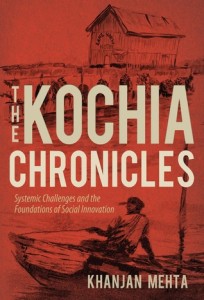ABOUT THE KOCHIA CHRONICLES
Kochia, a sleepy community on the shores of Lake Victoria in Western Kenya, is caught in the turmoil among traditional ways of life, excitement brought about by development projects and the throes of relentless globalization. Cellphones are spreading HIV and funerals are killing people. Cows are drowning in enormous holes dug by white people. Girls are dropping out of school and children are being rented to orphanages. Crusades and miracle services are blurring the lines between religion and crime. Along with the rapidly declining fish population in the lake, the time to 'teach people how to fish' has passed. It is time for direct and decisive action. Obongo, Okello, Sister Phoebe and friends unravel the complexities of community challenges and design practical solutions to address them. From cardboard coffins to toothbrush currencies and professional praising services, the solutions are simple, frugal and ingenious. The Kochia Chronicles take readers headlong into the lives and adventures of people in this quintessential African village as they usher in an era of design, innovation and entrepreneurship. The Kochia Chronicles owe their genesis to the author's experiences in conducting research and advancing technology-based social ventures in East Africa over the past decade. They draw heavily from the vast literature on development studies and the work of several innovators and entrepreneurs. The stories weave a compelling web of concepts, approaches, facts, statistics, norms, musings, emotions...and full-page illustrations to help readers empathize with the people, their context, and their choices. The Kochia Chronicles are fictitious narratives that bring to life the paradoxical simplicity and complexity of development challenges with the objective of informing and inspiring innovation that leads to the self-determined improvement of lives and livelihoods.Add to Goodreads:
The Story Behind “The Kochia Chronicles”
Over
the last decade, I have led poverty alleviation and sustainable
development projects in Kenya, Tanzania, India, China and other
countries. These projects range from telemedicine systems and ruggedized
biomedical devices to low-cost greenhouses, solar food dryers and
rainwater harvesting systems. Between the humble successes and the
countless failures, I have gained a good understanding of the simplicity
and complexity of challenges faced by these resource-constrained
communities.
Every
time I return home from fieldwork, my family and friends, my students’
parents, other faculty, and community members ask me about the projects.
As I start explaining how our rural health or greenhouse businesses
work, they quickly jump in, “That’s wonderful! Instead of giving them a
fish, you are teaching them how to fish.” While I politely smile and
acknowledge their Eureka moment, that proverb never fails to makes me
cringe.
How
do I tell them that Kenyans are expert fishermen, having honed their
skills over millennia. In just a few minutes, they can return with a
fresh Tilapia, or even a Nile Perch. The literacy rate in Kenya is 87%
and most people speak English. Almost everyone has access to a cellphone
and broadband internet is available across the entire country. And yet,
Kenya is amongst the poorest countries in the world with access to
food, safe water, sanitation, and primary healthcare a distant dream for
millions of people.
The
popular image of Africa, and one that is reinforced by media outlets,
is based on stereotypes of endemic violence, corruption, disease and
starvation. I wanted to correct this negative and oversimplified
perspective. I wanted to educate readers about “how things work” in one
little corner of Africa and showcase the people’s ingenuity, innovation
and resilience. So I integrated my personal experiences with scientific
research, statistics, norms, approaches and emotions to weave a series
of short stories called The Kochia Chronicles. I conducted research
specifically for this book over a three-year period and spent a year
writing it. Several translators helped me navigate the context and an
amazing sketch artist brought the stories to life through a series of 27
sketches.
The
Kochia Chronicles offer readers a glimpse of life, problems and
innovations in developing communities in the backdrop of the rapidly
evolving political, social, economic, technological and global context.
The stories delve into a wide range of issues including the HIV/AIDS
epidemic, the schooling system, traditional alcohols, gender issues,
counterfeit electronics, and the inner workings of the orphanage
business. And yes, one story discusses exactly why the “teach a man to
fish” adage is actually impractical in many parts of the world where
highly-skilled fishermen cannot access the millions of fish in their
vicinity due to a variety of cultural, economic or political reasons.
So, come and join Obongo,
Okello, Sister Phoebe and friends as they unravel the complexities of
community challenges and design practical solutions to address them.
ABOUT KHANJAN MEHTA
 Khanjan Mehta is the Founding Director of the Humanitarian Engineering and Social Entrepreneurship (HESE) Program at Penn State. The HESE program challenges students and faculty from across campus to break down disciplinary barriers and truly collaborate to develop technology-based solutions to address compelling problems facing resource-constrained communities. The objective is to develop transformative social innovations and scalable business models to transform these technology solutions into sustainable and scalable ventures that enable and accelerate positive social change. Mehta has led technology-based social ventures in Kenya, Tanzania, India, China and other countries. These ventures range from telemedicine systems and ruggedized biomedical devices to low-cost greenhouses, solar food dryers, cell phone-based social networking systems, and knowledge sharing platforms for self-employed women.
Mehta's research interests encompass affordable design; systems thinking; social entrepreneurship pedagogy; agricultural technologies and food value chains (FVCs); global health and telemedicine systems; cellphones, social networks and trust; indigenous knowledge systems; development ethics and grassroots diplomacy; women in engineering and entrepreneurship; and informal lending systems for micro-enterprises. The objective of these research endeavors is to democratize knowledge and mainstream HESE as a valid and rigorous area of learning, research, and engagement. He has published over 50 journal articles and refereed conference proceedings with a similar number in the pipeline.
Mehta has served on several university-wide and international committees and taskforces. He has delivered invited talks and keynote speeches on technology innovation, social entrepreneurship, and global sustainability at several universities and international conferences. The HESE program was the recipient of the 2013 W.K. Kellogg Foundation Engagement Award (Northeast Region) from APLU, 2011 Outstanding Specialty Entrepreneurship Program Award from the US Association for Small Business and Entrepreneurship (USASBE) and was named by Popular Mechanics as one of thirty "Awesome College Labs" across America. While these are good accolades, Mehta's primary focus is on the HESE ventures that his students are striving to build up to multi-million smile enterprises.
Khanjan Mehta is the Founding Director of the Humanitarian Engineering and Social Entrepreneurship (HESE) Program at Penn State. The HESE program challenges students and faculty from across campus to break down disciplinary barriers and truly collaborate to develop technology-based solutions to address compelling problems facing resource-constrained communities. The objective is to develop transformative social innovations and scalable business models to transform these technology solutions into sustainable and scalable ventures that enable and accelerate positive social change. Mehta has led technology-based social ventures in Kenya, Tanzania, India, China and other countries. These ventures range from telemedicine systems and ruggedized biomedical devices to low-cost greenhouses, solar food dryers, cell phone-based social networking systems, and knowledge sharing platforms for self-employed women.
Mehta's research interests encompass affordable design; systems thinking; social entrepreneurship pedagogy; agricultural technologies and food value chains (FVCs); global health and telemedicine systems; cellphones, social networks and trust; indigenous knowledge systems; development ethics and grassroots diplomacy; women in engineering and entrepreneurship; and informal lending systems for micro-enterprises. The objective of these research endeavors is to democratize knowledge and mainstream HESE as a valid and rigorous area of learning, research, and engagement. He has published over 50 journal articles and refereed conference proceedings with a similar number in the pipeline.
Mehta has served on several university-wide and international committees and taskforces. He has delivered invited talks and keynote speeches on technology innovation, social entrepreneurship, and global sustainability at several universities and international conferences. The HESE program was the recipient of the 2013 W.K. Kellogg Foundation Engagement Award (Northeast Region) from APLU, 2011 Outstanding Specialty Entrepreneurship Program Award from the US Association for Small Business and Entrepreneurship (USASBE) and was named by Popular Mechanics as one of thirty "Awesome College Labs" across America. While these are good accolades, Mehta's primary focus is on the HESE ventures that his students are striving to build up to multi-million smile enterprises.











0 comments:
Post a Comment